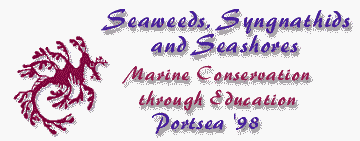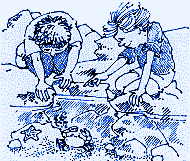 |
 |
Abstracts of Conference Papers
Conservation through Education
Beach Secrets Workshop
|
Jody Plecas, Marine education is a serious business. As a rule, kids get bored with being serious, particularly lower primary. Outside of school they are conditioned to a stream of endless entertainment. It takes a pretty good strategy to penetrate the 'hype' hardened psyches of school children. A perfect disguise for some serious education is a spoonful of the creative arts, an outdoor setting and lots of hands on activities. |
 |
Behaviour change
One of the things we are unlikely to achieve in marine education is wealth. So why bother? I left behind a career in credit where my wage was in the top two percent of female wage earners in Australia. I decided it wasn’t enough.
Why do we do want to educate about the ocean? What do we want to get out of it?
One of the outcomes dearest to a marine educator's heart seems to be positive behaviour change. At the recent Victorian Coastal Conference the well known MAFRI educator Patrick O' Callaghan had something interesting to say on how behaviour change comes about. To paraphrase, he said that there are basically two opportunities to elicit behaviour change, either through trauma or fun. Trauma as a strategy and agent of change seems fairly ill considered. More favourable by far is the pleasant often humour driven vehicle - fun. Fun wins hands down.
Giving life to a brilliant program
Presenters and teaching style
A good solid education program needs to have life. It is up to the presenters to provide this. Firstly their teaching style must be appropriate to the age and development level. This can be tricky and a good presenter is fine-tuning their presentation as they move along to suit the audience at hand. If audience attention is lost it is imperative to change what you are doing immediately. Often swapping over to a physical activity to demonstrate a point will do the job. A good presenter isn’t afraid to let go of the program to follow and interesting sideline that a student has interjected. A great presenter will amplify and use just such an opportunity and bring it back to bear on the subject.
Skits and Costumes
The world we live in is full of gimmicks. Using props and drama to build excitement brings focus to a topic. It creates an emotional involvement. These things give mental signposts that the mind refers to.
Colour
The world around us is a cacophony of colour and light. These things are a part of life. Where we ignore this connection to our students we lessen the scope of our impact upon them.
Hands on activities – use sight as well as smell, touch and sound.
All the words in the world cannot reach some children. However using a variety of senses to discover the world comes naturally to almost all. And nature uses these senses to a much greater degree than we do. To understand how nature works they must explore it in different ways.
Don't kill the excitement
It is important to have a plan to work, however, it shouldn’t be adhered to like a inventory schedule. Flexibility and adaptability are the name of the game. If something in a program isn’t working it must be abandoned in favour of a strategy that works.
Defining Moments
I love water. I love how I feel when I'm in it, the look of it. I love the nature of it - ice makes cold clear or milky sculptures, how waves look like liquid glass, how clouds silently make the sky fluffy and I love how rain cleans everything. I love water. But I can recall a certain event that made me want to do something to look after the ocean and its denizens. A defining moment. What was it for you? For me it was an adventure with a seal.
Seal Story
When I was little I remember a day I was intently peering into tidepools at La Jolla Cove in California. As usual I was lost in my thoughts – hunting for today's surprise – when a wave surge spread out across the platform. Suddenly my view of the pool was totally obscured.
As my eyes refocused I realised that a brown, fuzzy bewhiskered face with enormous brown eyes was looking straight up at me! The creature had slid up on the rocks turning belly up so it could peer straight into my face. It was only a few centimetres away from my nose! It must’ve have taken some pleasure in watching me jump out of my skin! Shock melted into joy and excitement. Soon I was bursting to share this wonderful bonding. A man and his children were nearby so I showed my seal to them only to turn and see them jabbing at it with a stick.
Two things from that day have always stayed with me. A fabulous one off adventure and the disregard that people have for the incredible world around them. Am I going to forget? Never! But we can make some magic happen when we teach children about the sea and we have an opportunity to change that disregard into respect.
St. Peters Primary School in East Bentleigh Victoria trialed the very first Gould League marine programs. Those ninety children finished grade six in Dec. '97. As part of their school yearbook they were asked to tell what was the most memorable thing they did during their primary school years. It was reported that the most popular reply was their trip to the beach with the Gould League in grade three.
Education disguised as fun has no equal. Activities with colour, costume and theatrics sweeten serious messages and result in long reaching learning outcomes. We have proven that a trip to the beach can become a precious moment in time – a memory treasure. As the memory about things that were seen, heard, smelled and felt at the beach surface it will act as a trigger for further understanding, motivation and behaviour change.
The secret is out – serious marine education can also be fun.